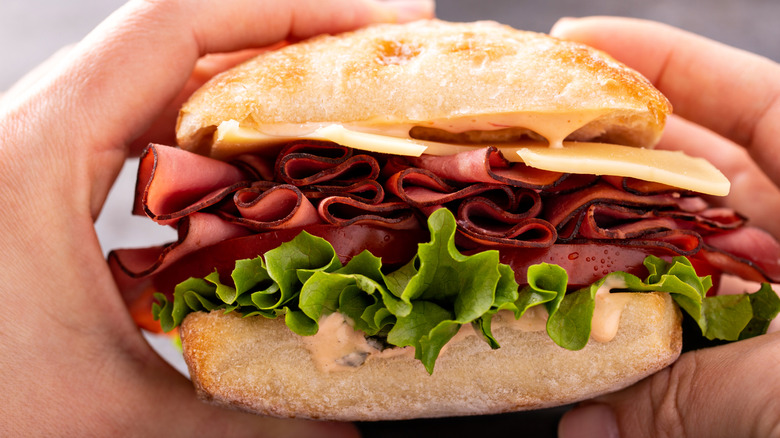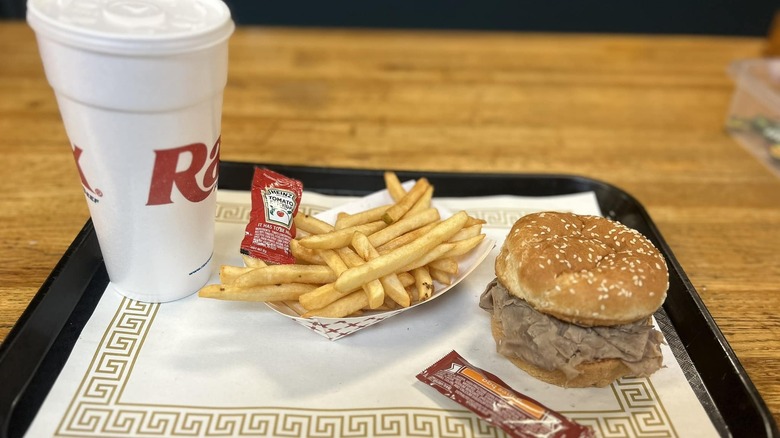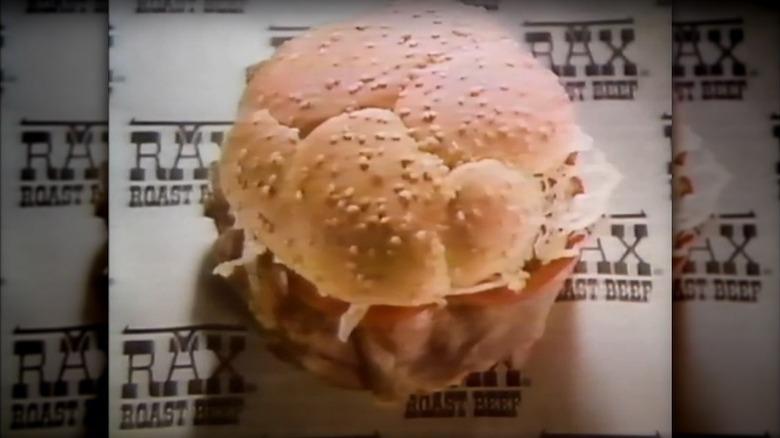The Once-Popular Roast Beef Fast Food Chain That Arby's Outshone
Restaurant rivalry is a survival-of-the-fittest contest that has seen many dominating chains thrive while others fade into obscurity. Burger King, for instance, used to have a Burger Queen nemesis chain, and fast food giant McDonald's had a rival chain called Burger Chef. Arby's, the top dog of roast beef sandwiches, also once had a challenger that it ultimately bested in the battle of beef.
The restaurant is known as Rax Roast Beef, though it's had a few other names during its lifetime, thanks to ownership changes and name amendments. Like Arby's is offers roast beef sandwiches as its primary menu feature. Once upon a time — way back in the 1980s — the company was doing quite well, with over 500 locations, including international sites. But through a series of poor decisions, the chain, which had once been growing healthily, experienced multiple bankruptcies and massive shutdowns of its locations. Today, Rax is all but extinct, with only a scattering of independently owned restaurants remaining in operation.
Some of the survivors have been slowly dwindling, too. A West Virginia branch of the franchise closed its doors in 2016, for instance. But, a bit like the little engine that could, the brand keeps fighting for its survival. An Ohio man named Richard Donohue, who got his start with Rax as a restaurant worker back in its heyday in the '80s, has purchased the trademark for the name. As of 2022, he owned six of the remaining restaurants. Donohue is reportedly trying to revive the brand — he opened a new restaurant in New Carlisle, Ohio, in October 2022, purchased property for another location in Chillicothe, Ohio, and has stated plans for further expansion. Only time will tell if his efforts can turn back a decades-old tide.
Poor executive decisions spelled disaster for Rax
Rax Roast Beef started out with the kind of business model that generally bodes success for a restaurant brand: a simple menu, a solid brand identity, and a clear target audience. It's a model that one of the remaining branches — the Joliet, Illinois restaurant — still successfully espouses after more than 50 years in operation. Unfortunately for the broader Rax company, executives lost sight of that clearcut approach to doing business.
They say if it ain't broke, don't fix it. But Rax's corporate leaders started making changes that quickly led to an identity crisis for the brand, including fattening up the once-streamlined menu to the point that it was unfocused and included way too many items — a costly mistake for restaurant ordering and solvency. The bloated menu eventually offered things like pasta, tacos, pizza, and, unthinkably, even Chinese food, and the beef sandwiches the brand was founded on got rather lost amid the confusion. On top of that, the company was implementing costly — and unnecessary — renovations across its locations, including adding solariums to the restaurants. It was an attempt to paint Rax as an upscale place to eat, all the while touting itself as an inexpensive place to dine in its advertisements. And as the Rax brand was floundering in the early '90s, a disastrously off-mark ad campaign pushed the chain further over the edge.
Enter Mr. Delicious and the final downfall of Rax Roast Beef
Endeavoring to appeal to adults and market the restaurants as grown-up places to eat, Rax introduced a cartoon spokesman named Mr. Delicious. He might have more aptly been named "Mr. Disastrous," though — a glum businessman who spent his airtime in the Rax commercials talking about vasectomies, his divorce, and psychotherapy, also hinting at an anger management problem. Rax company leaders admitted the ads were controversial but still defended them, saying that Mr. Delicious was "going to go down as one of the classic characters in advertising history," per this video released by the company. The releases, however, once again highlighted the fact that Rax didn't really know what demographic it was appealing to and, in its efforts, seemingly appealed to no one in the end.
Bankruptcy forced the company to close many of its corporate-owned locations, and it was all downhill for Rax from here. Many of the surviving independently owned restaurants also shuttered one by one over the years. The success of Arby's, which has over 3,000 locations in the United States as of September 2025, is proof that the roast beef sandwich-centered model works. Rax was founded on a staple that was similar to Arby's roast beef in both what's in it and how it's made, and the two companies debuted around the same time — Arby's in 1964 and Rax, then known as Jax Roast Beef, in 1967. So, it's anyone's guess how things might have been different if better corporate choices had been made while the Rax brand was at the height of its success. Looking forward, it remains to be seen if Richard Donohue, current owner of the brand, will succeed in his efforts to resuscitate it.



